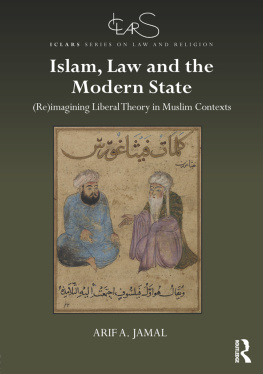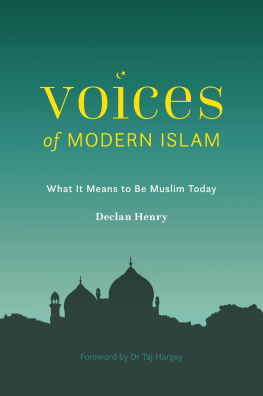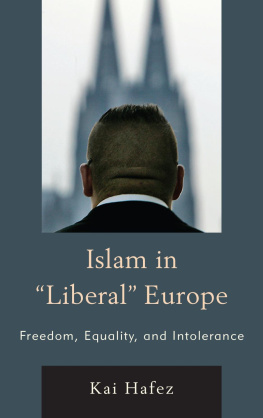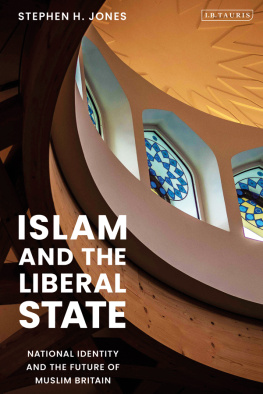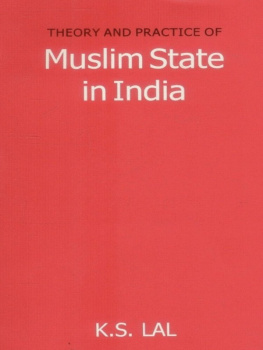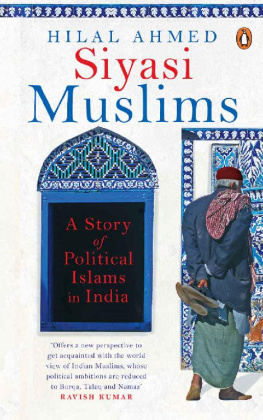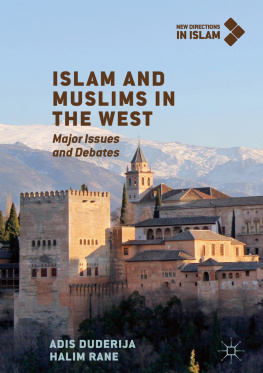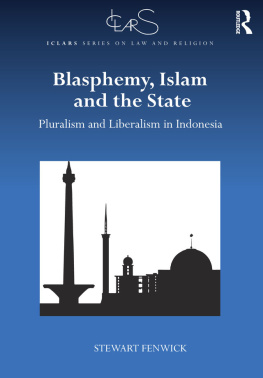Islam, Law and the Modern State
Within the global phenomenon of the (re)emergence of religion into issues of public debate, one of the most salient issues confronting contemporary Muslim societies is how to relate the legal and political heritage that developed in pre-modern Islamic polities to the political order of the modern states in which Muslims now live. This work seeks to develop a framework for addressing this issue. The central argument is that liberal theory, and in particular justice as discourse, can be normatively useful in Muslim contexts for relating religion, law and state. Just as Muslim contexts have developed historically, and continue to develop today, the same is the case with the requisites of liberal theory, and this may allow for liberal choices to be made in a manner that is not a renunciation of Muslim heritage.
Arif A. Jamal is Associate Professor at the National University of Singapore, Faculty of Law where he teaches comparative law, legal theory, law and religion, and Islamic law. He has studied and researched in law, politics and Islamic studies in Canada, the UK and the USA, and writes on issues of law and religion, comparative law and law in Muslim contexts.
This path-breaking study on comparative public law confirms that the globalisation of debates about the relationship of law and religion allows today a profound, sensible re-assessment of plurality-conscious justice as discourse. Truly liberal theories of justice can indeed be reformulated and contextually applied to include Muslim concepts. An argumentative masterpiece!
Professor Emeritus Werner Menski, SOAS University of London, UK
In a time of political Islamic reductionism, when the plural experience of Islam is at risk of being reduced to a dogmatic monolith, Jamals book invites Muslims to engage with liberal theories of justice not as the passive recipients of Western ideas, but as the active innovators of the local and global polity.
Professor Marco Ventura, University of Siena, Italy
This is a highly commendable and fresh contribution to the debates on the relationship between Islam and the Modern State, proposing a much needed third way apart from a theocracy or an anti-religious secular state. A well researched and highly recommended read.
Professor Mashood A. Baderin, SOAS University of London, UK
ICLARS Series on Law and Religion
Series Editors:
Silvio Ferrari, University of Milan, Italy, Russell Sandberg, Cardiff University, UK, Pieter Coertzen, University of Stellenbosch, South Africa, W. Cole Durham, Jr., Brigham Young University, USA, and Tahir Mahmood, Amity International University, India
www.routledge.com/ICLARS-Series-on-Law-and-Religion/book-series/ICLARS
The ICLARS Series on Law and Religion is a new series designed to provide a forum for the rapidly expanding field of research in law and religion. The series is published in association with the International Consortium for Law and Religion Studies, an international network of scholars and experts of law and religion founded in 2007 with the aim of providing a place where information, data and opinions can easily be exchanged among members and made available to the broader scientific community. The series aims to become a primary source for students and scholars while presenting authors with a valuable means to reach a wide and growing readership.
Other titles in this series:
Islam, Law and the Modern State
(Re)imagining Liberal Theory in Muslim Contexts
Arif A. Jamal, National University of Singapore, Singapore
Religious Freedom and the Australian Constitution
Origins and Future
Luke Beck, Western Sydney University, Australia
Free Exercise of Religion and the United States Constitution
The Supreme Courts Challenge
Mark P. Strasser, Capital University Law School, USA
Law and International Religious Freedom
The Rise and Decline of the American Model
Pasquale Annicchino, European University Institute, Italy
Proportionality, Equality Laws, and Religion
Conflicts in England, Canada, and the USA
Megan Pearson, University of Southampton, UK
Islam and Womens Income
Farah Deeba Chowdhury, Queens University, Canada
Blasphemy, Islam and the State
Stewart Fenwick, University of Melbourne, Australia
Islam, Law and the Modern State
(Re)imagining Liberal Theory in Muslim Contexts
Arif A. Jamal

First published 2018
by Routledge
2 Park Square, Milton Park, Abingdon, Oxon OX14 4RN
and by Routledge
711 Third Avenue, New York, NY 10017
Routledge is an imprint of the Taylor & Francis Group, an informa business
2018 Arif A. Jamal
The right of Arif A. Jamal to be identified as author of this work has been asserted by him in accordance with sections 77 and 78 of the Copyright, Designs and Patents Act 1988.
All rights reserved. No part of this book may be reprinted or reproduced or utilised in any form or by any electronic, mechanical, or other means, now known or hereafter invented, including photocopying and recording, or in any information storage or retrieval system, without permission in writing from the publishers.
Trademark notice: Product or corporate names may be trademarks or registered trademarks, and are used only for identification and explanation without intent to infringe.
British Library Cataloguing-in-Publication Data
A catalogue record for this book is available from the British Library
Library of Congress Cataloging-in-Publication Data
Names: Jamal, Arif A., author.
Title: Islam, law, and the modern state : (re)imagining liberal theory in Muslim contexts / by Arif A. Jamal.
Description: Abingdon, Oxon [UK] ; New York : Routledge, 2018. | Series: ICLARS series on religion and law | Includes bibliographical references and index.
Identifiers: LCCN 2017048591 | ISBN 9781138205482 (hardback)
Subjects: LCSH: Justice, Administration of (Islamic law) | Justice, Administration of. | Islam and justice. | Religion and law.
Classification: LCC KBP1572.J36 2018 | DDC 340.5/9dc23
LC record available at https://lccn.loc.gov/2017048591
ISBN: 978-1-138-20548-2 (hbk)
ISBN: 978-1-315-46681-1 (ebk)
Typeset in Galliard
by Apex CoVantage, LLC
For my parents
Contents
Within the global phenomenon of the (re)emergence of religion into issues of public debate, one of the most salient issues confronting contemporary Muslim societies is how to relate the legal and political heritage that developed in pre-modern Islamic polities to the political order of the modern states in which Muslims now live.
This work seeks to develop a framework for addressing this issue by drawing upon two sources. The first is an interpretative understanding of the history of Muslim contexts, emphasising, in particular, the diversity of views about what Islam mandates that have always been a part of Muslim experience and the distinction between political and religio-legal authority that developed in practice in these environments. The second source is a variety of contemporary liberal theory which this work develops and calls justice as discourse.
The central argument is that liberal theory, and justice as discourse in particular, though it may have emerged in a different social and cultural milieu, can be normatively useful in Muslim contexts for relating, religion, law, state and society. It is argued first that Muslim contexts are facing issues similar to those out of which liberal theory emerged. Additionally, it is argued that both Muslim contexts and liberal theory are dynamic and continually developing, and that this shared dynamism means that there may be space for convergence of the two. Just as Muslim contexts have developed historically (and continue to develop today), the same is the case with the requisites of liberal theory and this may allow for liberal choices to be made in a manner that is not a renunciation of Muslim heritage.

